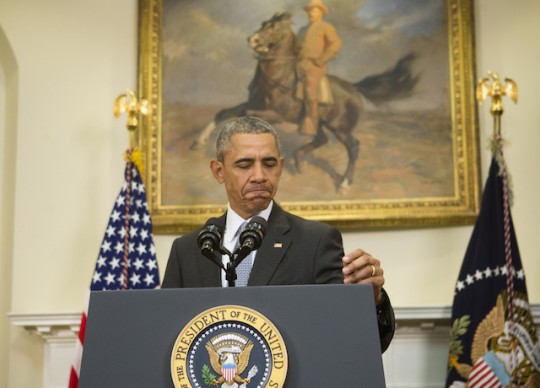Here’s an exercise for anyone laboring on the State Department’s seventh floor, or in the inner recesses of the White House, or in any of the handful of places where people seem to believe that the continued existence of the prison at Guantanamo Bay is a potent recruiting tool for terrorists. Pull up the most recent issues of Dabiq and Inspire, the English language magazines of ISIS and al-Qaeda, respectively. Then search the texts for the words Guantanamo, Gitmo, and Cuba.
Your searches will turn up zero results. If you want a more thorough look at the role Guantanamo has played in the public pronouncements of Sunni terrorist groups, check out this handy 2015 survey from a pair of young researchers at Brookings. It concludes, basically, that Gitmo comes up from time to time, but that it bears much less emphasis than other elements of the jihadist indictment of America and the West—and that in recent years it is mentioned much less frequently.
All of which is to say that this morning, when President Obama claimed in his preening, exasperated remarks that the existence of the prison is "counterproductive" and used as "propaganda" against the United States, he was talking nonsense, and wildly overemphasizing the role of this one facility. If Guantanamo were to close today, the terrorists would still hate us. If it had never opened, they would still hate us. And if it "harms our partnerships with our allies," as Obama also claimed this morning, how does the level of harm compare to that caused by the regional collapse Obama has presided over in the Middle East, and the destabilization of the European Union by the resulting refugee crisis?
Obama spoke this morning as though the closure of Guantanamo would be a net gain for our national security, and as though there had never been any justification for it in the first place. But the best argument for its existence has always been that the federal courts are fickle, and individuals on U.S. soil tend to be accorded by those courts the full set of constitutional rights enjoyed by Americans. Obama cited several successful prosecutions of terrorists in federal courts, but the fact is that the presence of these detainees on U.S. soil would make it possible that they could one day go free.
If a detainee is responsible for the deaths of thousands of Americans, or has engaged in as-yet-unfulfilled conspiracies to a similar end, this outcome is unacceptable.
In any event, Obama’s "dead-on-arrival" plan to work with Congress to close the facility and move the remaining detainees to America amounted to nothing new. He is still going to negligently release dangerous detainees to other countries, which apparently Congress can’t prevent him from doing. Not mentioned by the president: the roughly 1/3 recidivism rate that applies to Guantanamo alumni, most recently and vividly illustrated by the case of Ibrahim al-Qosi, released in 2012 and now the front man for al-Qaeda in the Arabian Peninsula. And just this very morning (!) news broke that an as-yet-unnamed alumnus was arrested during an operation by Spanish and and Moroccan authorities that targeted members of an ISIS cell.
In addition to the transfers, Obama is still going to try to move the rump group—for whose release the military refuses to provide him with political cover—to the United States, which apparently Congress can prevent him from doing. Amusingly enough, the president won’t say where in the U.S. he wants to move these men. But he does want the public to know that he understands their concerns:
I think a lot of the American public are worried about terrorism, and in their mind the notion of having terrorists held in the United States rather than in some distant place can be scary. But part of my message to the American people here is we're already holding a bunch of really dangerous terrorists here in the United States, because we threw the book at them, and there have been no incidents. We've managed it just fine. And in Congress I recognize, in part, because of some of the fears of the public that have been fanned oftentimes by misinformation, there continues to be a fair amount of opposition to closing Guantanamo.
Emphasis mine. The condescension of these words is remarkable. Note that it’s not Obama who is worried about terrorism—it’s the American public, the chumps. Nor does Obama say that bringing terrorists onto U.S. soil is "cause for concern" or some similarly conciliatory phrasing. No: "in their mind" it "can be scary." Scary—like the dark, or whatever a child thinks is hiding under his bed.
Moreover, opposition in Congress—extraordinary, bipartisan opposition—isn’t principled, nor does it represent a differing policy view that stems from a legitimate, if erroneous, set of arguments. Opposition arises from the public’s "fears," which themselves only result from "misinformation." If you didn’t watch the speech, know that this was all conveyed in the sort of scolding tone reserved for when your kid has left his bike lying in the driveway again.
This speech or its associated plan will have little effect on the future of Guantanamo. But if some future historian wants to investigate why Americans were considering electing Donald Trump their president in 2016, remarks like this morning’s will make a fine illustration.
